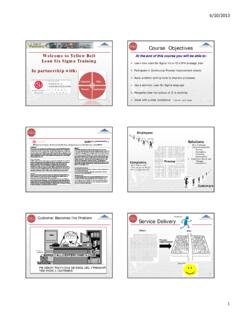Transcription of General Accounting and Budget Terminology
1 Glossary of Selected Governmental Accounting and Financial Terminology Page 1 A Accounting system . The total structure of records and procedures which discover, record, classify, and report information on the financial position and operations of a governmental unit or any of its funds, balanced account groups, and organizational components. ACCRUE. To record revenues when earned and to record expenditures as soon as they result in liabilities for benefits received, notwithstanding that the receipt of cash or payment of cash may take place, in whole or in part, in another Accounting period. AGENCY FUND. A fund consisting of resources received and held by the governmental unit as an agent for others; for example, taxes collected and held by a municipality for a school district.
2 Note. Sometimes resources held by one fund of a governmental unit for other funds of the unit are handled through an agency fund. An example would be taxes held by an agency fund for redistribution among other funds. ALLOCATE. To divide a lump-sum appropriation into parts which are designated for expenditure by specific organization units and/or for specific purposes, activities, or objects. ALLOCATION. A part of a lump-sum appropriation which is designated for expenditure by specific organization units and/or special purposes, activities, or objects. In Federal usage, a transfer of obligational authority from one agency to another. ALLOT. To divide an appropriation in amounts which may be encumbered or expended during an allotment period.
3 ALLOTMENT. A part of an appropriation (or, in Federal usage, parts of an apportionment) which may be encumbered (obligated) or expended during an allotment period. ALLOTMENT LEDGER. A subsidiary ledger which contains an account for each allotment showing the amount allotted, expenditures, encumbrances, the net balance, and other related information . APPROPRIATION. An authorization from a specific fund to a specific agency to make expenditures/incur obligations for a specified purpose and period of time. In California State Government, the Budget Act contains many appropriations, or items. These appropriation items are limited to one year, unless otherwise Glossary of Selected Governmental Accounting and Financial Terminology Page 2 specified.
4 Appropriations are made by the State Legislature in the annual Budget Act and in other legislation. Legislation can provide for continuing appropriations (which require no subsequent legislative action) and are also provided by the California Constitution. APPROPRIATIONS LIMIT. In California State government as defined in Section 8 of Article XIIIB of the California Constitution, enacted by the passage of Proposition 4 at the November 6, 1979 General election and amended with the passage of Proposition 111 at the June 5, 1990 primary election, the growth in the level of certain appropriations from tax proceeds are generally limited to the level of the prior year's appropriation limit as adjusted for changes in California per-capita personal income and population.
5 Other adjustments may be made for such reasons as the transfer of services from one government entity to another. ASSETS. Financial representations of economic resources owned by an organization or individual. "[P]robable future economic benefits obtained or controlled by a particular entity as a result of past transactions or events." Statement of Financial Accounting Concepts No. 3, "Elements of Financial Statements of Business Enterprises," Financial Accounting Standards Board, Stamford, Conn. AUDIT. The examination of documents, records, reports, systems of internal control, Accounting and financial procedures, and other evidence for one or more of the following purposes: a.
6 To ascertain whether the statements prepared from the accounts present fairly the financial position and the results of financial operations of the constituent funds and account groups of the governmental unit in accordance with generally accepted Accounting principles and on a basis consistent with that of the preceding year. b. To determine the compliance with applicable laws and regulations of a governmental unit's financial transactions. c. To review the efficiency and economy with which operations were carried out. d. To review effectiveness in achieving program results. AUXILIARY ENTERPRISES. Activities of a college or university which furnish a service to students, faculty, or staff on a user-charge basis.
7 The charge is directly related to, but not necessarily equal to, the cost of the service. Examples include college unions, residence halls, stores, faculty clubs, and intercollegiate athletics. Glossary of Selected Governmental Accounting and Financial Terminology Page 3 B BASELINE ADJUSTMENTS. One of the three CSU categories formerly used for development and presentation of the Board of Trustees Support Budget request. Effective with the 1992/93 fiscal year this format was discontinued. This category consisted of adjustments made to the previous year's appropriations to provide for mandatory increases such as price inflation, staff benefit increases, and salary step increases for employees.
8 This category also included the deletion of non-recurring items and additions to finance the implementation of recent legislation. The result of these adjustments to the previous year's appropriations was the Baseline Budget . See Program Maintenance Proposals and Program Change Proposals. BALANCE SHEET. A statement which discloses the assets, liabilities, reserves, and equities of a fund or governmental unit at a specified date, properly classified to exhibit financial position of the fund or unit at that date. BOOKS OF ORIGINAL ENTRY. The record in which the various transactions are formally recorded for the first time, such as the cash journal, check register, or General journal.
9 Where electronic data processing methods are used, it may happen that one transaction is recorded almost simultaneously in several records, one of which may be regarded as the book of original entry. Budget . A plan of financial operation embodying an estimate of proposed expenditures for a given period and the proposed means of financing them. Used without any modifier, the term usually indicates a financial plan for a single fiscal year. Budget BILL and Budget ACT. In California State government, the Budget Bill is prepared by the State Department of Finance and is submitted to the Legislature in January accompanying the Governor's Budget . The Budget Bill is the Governor's proposal for spending authorization for the subsequent fiscal year for on-going programs authorized by the Legislature.
10 The State Constitution requires the Legislature to pass the Budget Bill and send it to the Governor for signature by June 15. After signature by the Governor, the Budget Bill becomes the Budget Act. BUDGETARY ACCOUNTS. Those accounts which reflect budgetary operations and condition, such as estimated revenues, appropriations, and encumbrances, as distinguished from proprietary accounts. Glossary of Selected Governmental Accounting and Financial Terminology Page 4 C CAPITAL Budget . A plan of proposed capital outlays and the means of financing them for the current fiscal period. It is usually a part of the current Budget . If a Capital Program is in operation, it will be the first year thereof.








